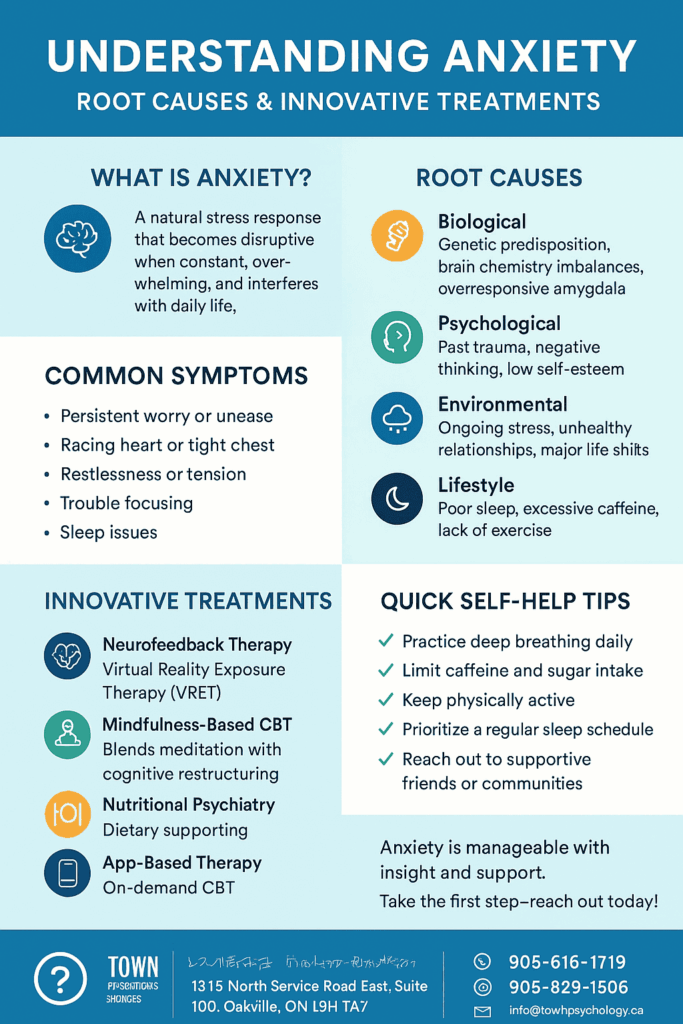The sudden brain-smothering feeling, with breathlessness and heart palpitations, and racing thoughts are classic symptoms of an anxiety attack/episode. The Generalized Anxiety Disorder (GAD) can have a pretty tight hold over one’s’s life and dreams, as the suffocating nature of chronic worry and anxiety can cause significant distress and impairment. In this guide we will explore anxiety root cause and its innovative treatments.
What Causes Anxiety?
Anxiety is a complex emotion that can stem from a combination of biological, psychological, and environmental factors. Genetically, some individuals may have a predisposition to anxiety, while brain chemistry, particularly imbalances in neurotransmitters like serotonin, also plays a role.
Psychologically, past traumas, negative thought patterns, and certain personality traits can contribute. Environmentally, chronic stress from life events like work pressure, financial difficulties, relationship problems, or even exposure to traumatic situations can trigger or worsen anxiety, making it a multifaceted condition that varies in its causes and manifestations for each individual.
However, anxiety symptoms and patterns can be managed with the help of consistent and fruitful therapy sessions, mindfulness practices, and sometimes medication. It has been noticed that anxiety, as well as depression do run in families.
If either of the parents struggle with anxiety, their children are at an increased risk of being biologically predisposed to anxiety sensitivity. Researchers continue to find deeper truths about what causes anxiety. Here are possible conditions that cause anxiety. Notably, there is some comorbidity between depression and anxiety.

Genetic
As mentioned above, DNA plays a key role when it comes to Anxiety. The genetic history of having mood disorders in your family does make you more vulnerable to anxiety.
However, that doesn’t mean that you have to live with the limits that anxiety disorder puts on you or your life. Even if you have a genetic history of anxiety, you have the opportunity to seek support through therapy..
Seeking therapy, and if needed with medication, prepares you to manage anxiety symptoms and lead a fulfilling, thorough life. With consistent mindfulness practices, realistic thinking owing to therapy, box-breathing techniques, and regular exercise, you are likely to experience a significant improvement in your functioning and how you feel.
Environmental
If one’s childhood is spent in an environment that is unstable, unhealthy, filled with conflicts (especially in family), and friction, it is possible that it makes the individual likely to develop an anxiety disorder. A healthy brain and body thrive only in a healthy and pleasant environment that is supportive and warm.
Physio-psychological factors
A certain set of vitamin deficiencies (like B complex, magnesium, and so on) can provoke an anxiety disorder. These deficiencies affect the nervous system and brain function gravely. Anxiety takes place when neurotransmitters like serotonin and Gamma-Aminobutyric Acid (GABA), as well as norepinephrine and dopamine, become imbalanced.
Also, some diseases can cause anxiety, such as fibromyalgia, as the disease hits the nervous system. Apart from that, a sedentary lifestyle with the least healthy habits also triggers anxiety. Unfortunately, a very large part of youth today is facing mental health struggles.
Life Events – Tragedies – Loss
Life is full of ups and downs. But at times, too many downs with high intensity can break a person’s will and happiness. Also, a partner’s death or a parent’s death can give you a sense of deep grief for a long time.
Sometimes, undesirable occurrences in career or professional life can also trigger deep-seated trauma and cause anxiety. At times, big changes also become the reason behind anxiety, like moving to a new city or having a child, can trigger intense feelings of uncertainty.
Brain Structure and Function:
An anxious person’s brain functions a bit differently. The amygdala (part of the brain that is involved in processing fear and emotion) becomes overactive in cases of anxiety. This keeps a person in constant ‘fight or flight’ mode.
Substance Use
Oftentimes, withdrawal from smoking, alcohol, or even caffeine can trigger anxiety symptoms. Alcohol, caffeine, nicotine, and illicit drugs can all disrupt the delicate balance of brain chemistry. Remaining a mile away from drugs and smoking is the key here; however, it’s never too late to get rid of them. To rid oneself of such addiction, take professional help from a psychotherapist and lead a healthy and more desirable life.
Anxiety is far more complex than a mere nervous stomach. It’s a multifaceted condition, often woven from a tapestry of interwoven factors, making its root causes unique to each individual. An experienced mental health professional near you would be the best solution. Understanding these origins is the first compassionate step towards finding effective relief and reclaiming your inner peace.

